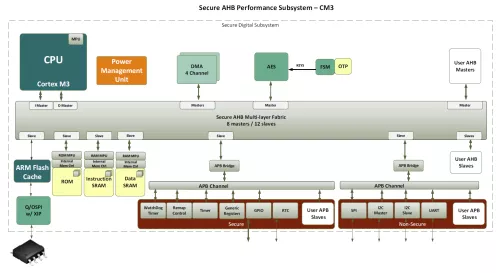The Silvaco Secure AHB Performance Subsystem is a high-performance AHB subsystem that allows for a high level of hardware and software security. It integrates a security conscious processor, the ARM Cortex-M3, with a security conscious low power high-performance subsystem. Everything is pre-integrated with the necessary AHB and APB IP cores needed to run a small software kernel or a Real Time Operating System (RTOS). This subsystem is ideal for any deeply embedded system that requires enhanced security and protection from cyber-attacks and intrusions, such as IoT, smart sensors, smart controllers, and mixed signal devices.
Security in the Cortex-M3 is based on the MPU, Handler Mode, and privilege level. There are 8 memory ranges supported by the MPU and, it only regulates one master - the processor - in a multimaster system. To prevent additional masters from violating system integrity, the Secure AHB Subsystem adds the following IP:
• Secure AHB Fabric
• SRAM Programmable Memory MPU
• ROM Parameterized Memory MPU
The Secure AHB Fabric connects several AHB Masters (secure or non-secure) to several AHB Slaves (secure or non-secure) in a crossbar switch arrangement. In this system, only the processor can produce secure AHB transactions, and all other AHB Masters are always designated as non-secure . AHB Slaves are categorized by the Fabric as either secure or nonsecure, depending on the level of protection that is desired. A special case exists for memories, which are designated as nonsecure slaves by the Fabric. Security enforcement for memories is performed instead by the SRAM Programmable Memory MPU and/or the ROM Parameterized Memory MPU. This arrangement provides for greater flexibility for each physical memory - each memory may be divided into secure and nonsecure regions - and potentially reduces the number of memory instantiations in the system. The Secure AHB Fabric& Memory MPUs can be used stand-alone, or in conjunction with the ARM Cortex-M3’s Memory Protection Unit (MPU). The Secure Fabric can take care of all coarse memory security partitioning leaving more room in the MPUs for finer tuning.
Secure AHB Performance Subsystem - ARM M3
Overview
Key Features
- Processor Options
- ARM Cortex-M3 with low power logic, JTAG, MPU
- Optional Instruction/Data Mux (Von Neuman or Harvard Architecture)
- Optional ARM Flash Cache (order separately from ARM)
- Infrastructure
- CPU
- Secure AHB Bus Matrix / Decode – 8 masters, 12 slaves
- AHB to APB Bridge (2)
- JTAG
- Standard Peripherals
- 8,16,32-bit Internal SRAM Controller with MPU
- ROM with MPU
- Power Management Unit
- DMA (4 channels)
- AES with optional secure key loader
- Windowed Watchdog Timer
- Timers (2)
- Remap Register
- Real-Time Clock
- Configurable Peripherals
- Secure AHB Fabric Interconnect
- GPIO (width, interrupt capability)
- I2C Master
- I2C Slave
- SPI Master / Slave
- Quad SPI Master / Slave (Octal SPI Master optional) 16550 UART
- Generic Registers
- Hardware Security Features
- ARM Memory Protection Unit (MPU) & Privilege level
- SRAM & ROM MPUs
- AES H/W Encryption/Decryption
- Keys for AES can be in NV or OTP memory and directly loaded into AES registers (No processor access)
- AHB Fabric is parameterized so each master and slave can be designated as secure or non-secure
- If a non-secure AHB master attempts to access a secure AHB slave, the access is blocked, bus info is captured, and an interrupt can be generated
- Software
- An RTOS (such as Free RTOS) may be used
- Secure Flash Loader, Boot Loader
- Examples using AES, Secure Fabric, and MPU
- Interrupt and Fault Handlers
- Use of Main and Process Stacks
- Supervisory Call (SVC) examples
- Hardware Adaption Layer / Drivers
- AES, GPIO, QSPI, Timer, UART, Watchdog Timer
Benefits
- Quick development start up
- Low power plus performance to handle most IoT software
- Integration and software support available
- Cost effective
Block Diagram

Applications
- IoT Edge Devices
- Medical Devices
- Mixed Signal Digital - MEMS
- Smart Sensors, Smart Metering, Smart Lighting
- Health Monitors
- Home / Office
- Surveillance, Home Automation, Smart Thermostats
- Industrial
- Machine / Motor Control, System Health Monitoring
Deliverables
- Verilog RTL source code
- Test bench with test suites
- Documentation including User's Guide and Integration Guide
- Technology-independent synthesis constraints
Technical Specifications
Foundry, Node
all
Maturity
Silicon Proven
Availability
Now